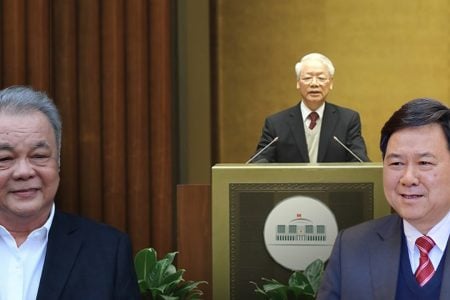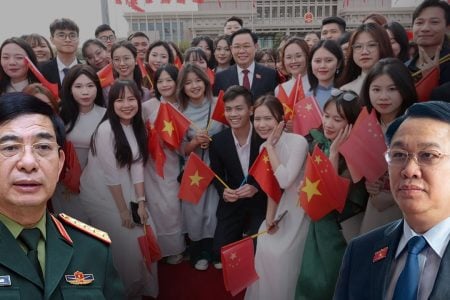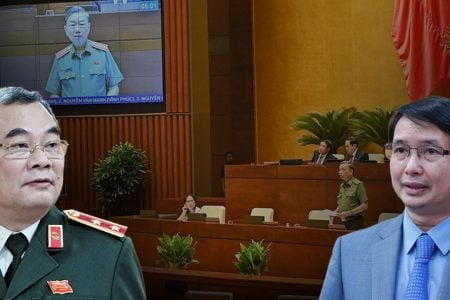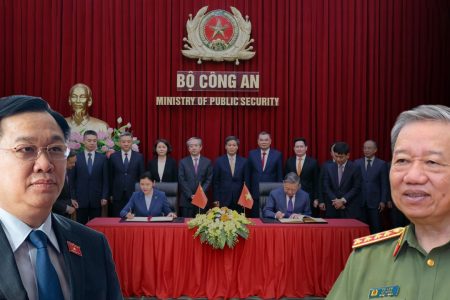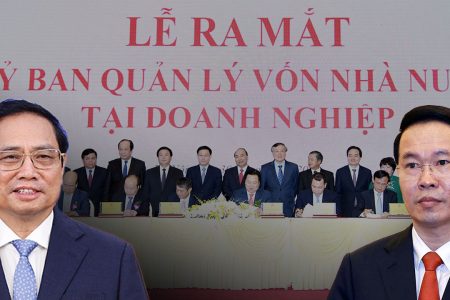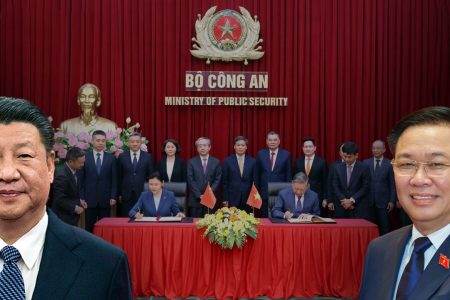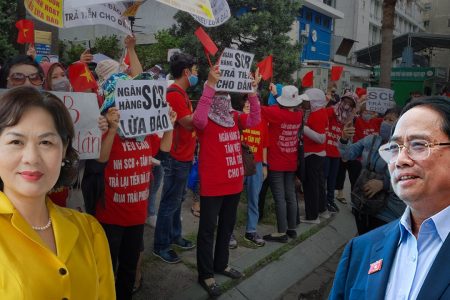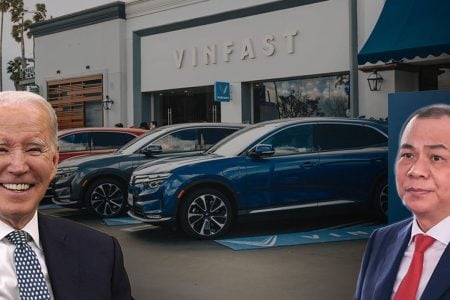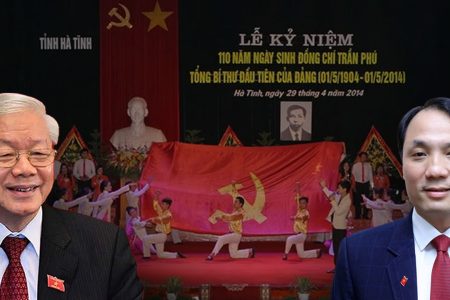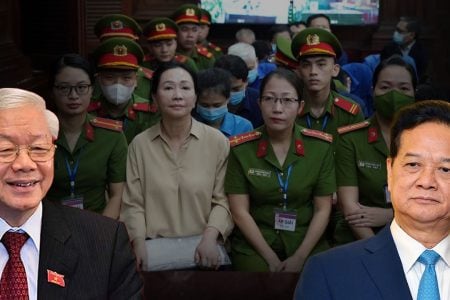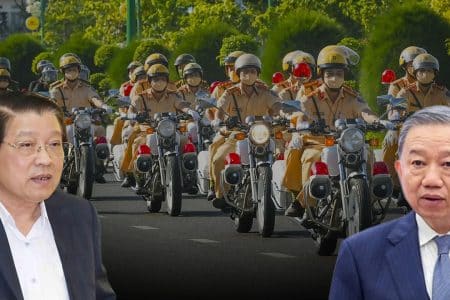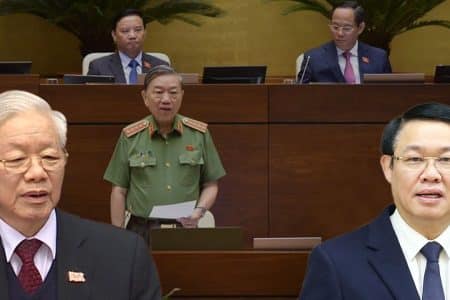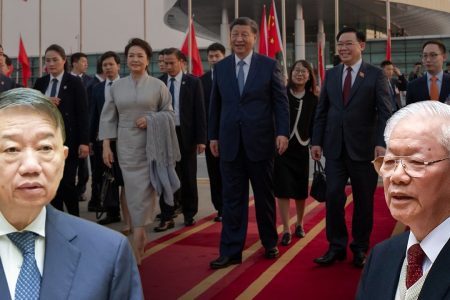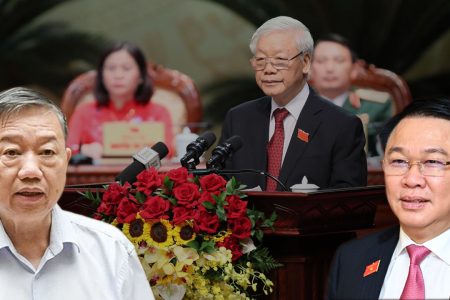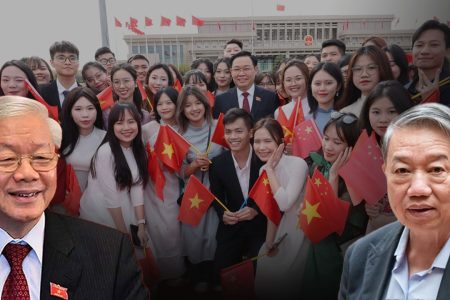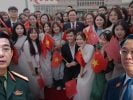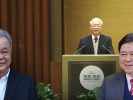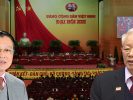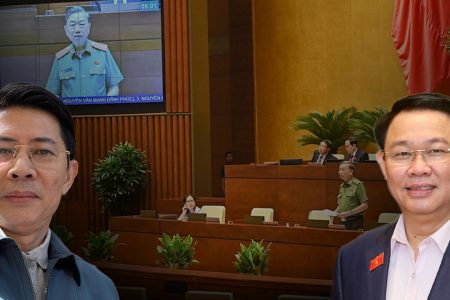
The war going on in Ukraine makes many Vietnamese people wonder if someday it will be our turn again?’ This is a very legitimate fear.
The two wars Ukraine and Vietnam are very different. However, there is also a similarity in terms of geopolitics: Ukraine is located close to Russia, considered by Vladimir Putin as a buffer zone with NATO. The Chinese leadership considers Vietnam a buffer zone between them in the free world, while the US considers Vietnam a “shield” to shelter from the storms coming from Beijing.
The first question is looking from Washington D.C. How important is Vietnam in the US political world?
American military experts assess the importance of Vietnam in three aspects:
About the location: Vietnam is close to China, and right next to the most important shipping lane in the world;
Geopolitics: Vietnam is the most powerful country militarily in the South China Sea (Vietnam calls it the East Sea)
In terms of strategy: Vietnam’s importance stems from the Pentagon’s calculation that there are two Asias: mainland and island (Japan, Taiwan, Philippines, Indonesia, Malaysia, Singapore). In island Asia, the US already has strong allies in Japan, Korea, and now Australia through AUKUS. In mainland Asia, there are no strong allies, so Vietnam is in great need
Vietnam’s strategic location
Today there is another tactical dimension: the role of the Cam Ranh naval base. This is the location that the US desperately needs to make a base for maintenance and refueling for its 7th Fleet, especially submarines with nuclear warheads that are now dense in the Pacific. These fleets can quickly respond to Chinese and North Korean nuclear missiles fired at Guam, Honolulu, or California.
Talking about Cam Ranh, we have heard both American and South Vietnamese military leaders talk about a strategic advantage of Vietnam that no other country in Asia has: “Cam Ranh plus Ban Me Thuot is a military beauty.”
If you install an air defense system on top of Ban Me Thuot, connected to battleships, nuclear submarines, and aircraft carriers at Cam Ranh, you can control both the Pacific Ocean and part of the Indian Ocean.
It was in the 20th century, when the US did not have the current advanced THAAD air defense system, which can be controlled remotely, and has been successfully tested 16 times continuously.
And recently, in January 2022 it was actually used to intercept a ballistic missile of Youthi forces in Yemen, and was successful.
In addition to Cam Ranh, there are also Da Nang, Phu Cat, and Chu Lai airports, which are very powerful naval and air bases to control the Chinese fleet (bases in Hainan and the Hoang Sa/Paracels).
Few people remember that in 2011, the US launched a plan to clean up Agent Orange at Da Nang airport with a grant of $183 million. This is a humanitarian action, but it also has the benefit of returning Da Nang to its strategic position as before.
Vietnam’s role in the 21st Century is even more important than in the 20th Century because until the early 1970s China was still a poor, slow-moving country. Now that China has become a great power both economically and militarily, the potential danger to the United States has increased.
That is also the reason that President Joe Biden gave when he hastily withdrew from Afghanistan to focus on the strategy of countering China.
Are there common interests between the US and Vietnam?
On March 20, Admiral John C. Aquilino, commander of the Indo-Pacific Command, told the AP on a military flight that China has now fully “militarized” at least three of the islands they built in the South China Sea.
Washington’s main goal in the disputed region, according to Admiral Aquilino, is “preventing war.” “If deterrence fails, then my second mission is to be ready to fight and win,” he said.
He also mentioned that China has positioned anti-ship missiles, anti-aircraft, laser guns, avionics, and destroyers on some artificial islands [in the Hoang Sa/Paracels and the Truong Sa/Spratlys it took from Vietnam in 1974-1988].
Thus, China will be able to take advantage of the situation of the Ukraine war or the re-emergence of Covid to force the US and its allies to pay less attention to Asia, and then use the excuse that the part of the U-shaped line is its territory / territorial sea, may suddenly startup.
They could, for example, use military installations on Fiery Cross Reef, Mischief Reef, or Subi Reef to rapidly seize more of Spratlys. This would put Vietnam in a ‘fait accompli’ like in Paracels in 1974 and at Gac Ma (Johnson Reef) in 1988. Vietnam’s East and Southeast flanks are considered locked.
But now, 60% of the world’s most powerful US navy is present in the Pacific and they have naval experience, compared to China, which only has experience after small battles in the Paracels and Gac Ma. Remember that combat experience is often more important than weapons and equipment. The United States had no experience of guerrilla warfare in South Vietnam and Russia, likewise, is bogged down in Ukraine.
In addition, for fixed targets at sea (such as Fiery Cross Reef, Mischief Reef, or Subi Reef), the US has a tactical advantage because they are “fixed targets” in “fixed locations” within range of the US Navy.
In the May 21, 2015 issue of the “War Is Boring” magazine, author Kyle Mizokami commented: “Just 10 medium-range Tomahawk missiles can destroy all aircraft, radars, and towers control, fuel storage, and weapons on Fiery Cross Reef for several hours” and “the former battleship USS Michigan carried 154 Tomahawks.”
Who will support Vietnam if China is aggressive?
Now, looking at the prospect of the Russo-Ukrainian war, surely many Vietnamese have thought of the possibility of a Sino-Vietnamese war.
Dr. Nguyen Tien Hung asked if China occupied Truong Sa Lon, who would support Vietnam?
When attacked, Ukraine was alone because it was not a member of NATO. Now NATO and the US can only support indirectly through the supply of weapons, food, and money, but cannot directly intervene, cannot open a “No-fly zone” in Ukraine.
Will Vietnam have any support if China invades and occupies the Spratlys, or destroys some oil rigs on the continental shelf, let alone spills across the border?
And if it spills over, it won’t be like 1979 because China has become a great power. Drawing lessons from 1979, China will be able to bombard and launch missiles to wreak havoc on the border before the tanks cross.
Recently, there is a question: can Vietnam’s few T-90 tanks be able to resist modern Chinese drones?
In 2016, China protested against Vietnam’s reclamation of the Spratly Airstrip.
Before that, in 1988, although Vietnam was still in the Warsaw Pact and had a treaty with the Soviet Union when China attacked Gac Ma, the Soviet Union did not intervene.
We remember back in 1992 – when the US was considering relations with Vietnam, President Boris Yeltsin (the patron of President Putin) visited the US, declaring without hesitation that Vietnam still kept American POWs, and is being kept in Russia. Hearing that, President George H. Bush was shocked.
In the early morning of June 17, 1992, when we read this news on the front page of the Washington Post, we were really surprised.
It turned out that it was all for the sake of self-interest: at that time, America’s hot issue with Vietnam was just finding the living POWs, which Mr. Yeltsin claimed. Maybe because Yeltsin went to the US to ask for economic help, he sacrificed the interests of Vietnam?

Putin’s Russia today needs China more than Vietnam. And specifically, Moscow and Hanoi no longer have a military or political alliance, apart from the “missing Soviet Union” sentiment of some people.
I see that the “Four Nos” policy of diplomacy puts Vietnam in a lonely place, without allies.
Vietnam’s Defense White Paper 2019 states that Vietnam pursues Four No’s policy: not joining a military alliance; not allowing any country to set up military bases in Vietnam; do not rely on one country to fight the other, and not using force or threaten to use force in international relations.
Thus, if attacked by China, can Vietnam at most only get one vote at the United Nations to condemn the aggressor? Because of China’s pervasive influence, many countries will abstain, such as Vietnam twice voted on Ukraine. But just condemning does not change the situation of “the fait accompanies.”
To compete with China, the whole world now has only the US, as British Prime Minister David Cameron once commented. So Vietnam really needs the US.
On the other hand, the US also needs Vietnam as mentioned above.
However, Vietnam is in a jam. On the one hand, if it wants to “escape China” then it must go with the US. But going with the US is more apprehensive.
Can Vietnam trust the US?
The question is “can the US convince Vietnam or not?”
In addition to being subjected to heavy pressure, encouragement, and deterrence from China, there is also the issue of the credibility of the United States.
Surely the Vietnamese leadership has also asked the question: “how can we believe that the US will not abandon us as it fled from South Vietnam and, more recently, from Afghanistan?”
This is the most pressing problem for America – for Vietnam and other countries that want US protection. Therefore, President Biden has just made moves in Poland to reassure NATO allies.
There is a possibility that the US actually set up a scene for Mr. Biden to say “President Putin cannot continue to be in power“, and then the junior official corrected that he just wanted to say “Putin is not allowed to exercise power over his neighbors.”
With Vietnam, I see that the top leaders of the United States, from both parties, are aware of the suspicions of Hanoi and always emphasize cooperation on the basis of “common interests.”
Visiting Vietnam in 2016, President Barrack Obama talked about “prosperity, security and stability goals so that the two countries can promote each other.”
After President Obama, President Trump said in Hanoi that he came “to reaffirm ties with Vietnam to find common goals, common interests,” and wanted to “upgrade the relationship between the US and Vietnam to a strategic partnership.”
Vice President Kamala Harris in turn also mentioned “our enduring relationship with Vietnam and Southeast Asia” as a member of the Indo-Pacific region.
Phrases like “security and stability goals” “common goals, common interests” or “strategic partnership” can all be interpreted with the same aim of countering the ambitions of China. And this ambition, in the foreseeable future, will be difficult to stop, because “Beijing has a secret 100-year strategy to replace the United States as the number one power in the world by 2049, the 100th anniversary of the founding of the People’s Republic of China” – that is the argument of Michael Pillbury, a famous expert on China in the book The Hundred-Year Marathon published in 2015, which was noticed by the American public.
It is also possible that Beijing will miscalculate the intentions and capabilities and determination of the United States if it decides to attack Taiwan. This can be a win-lose battle. Because after this battle, China’s strategy will definitely have to change. For example, the Russian-Ukrainian war is currently going on. Public opinion currently believes that Mr. Putin has miscalculated in terms of strategy, tactics, and geopolitics.
In 1958, from Washington, I witnessed President Eisenhower’s reaction when China shelled Quemoy and Matsu, two islands of Taiwan, adjacent to Fujian.
Then in 1995-1996, the world was also surprised to see the strong reaction of President Bill Clinton when China conducted a series of missile tests in the waters around Taiwan including the Taiwan Strait. Then China had to stop unconditionally.
Emperor Hirohito miscalculated when he attacked Pearl Harbor on December 7, 1941, because he thought that the US was still busy on the European battlefield, so it was impossible to fight on both fronts at the same time. So Japan can inflict a “punch” on the US without fear of overreaction. Another tactical miscalculation: The Japanese fleet believed that a surprise attack on Sunday morning was safe because the US Navy’s ‘ready to fight’ status was low over the weekend, and the troops on the ships would die. But the Japanese did not think that on Sunday morning, American officers and soldiers would go ashore to rest. They escaped death for revenge.
Of course, we cannot rule out the possibility that in the wake of the awakening of the US – and the world – and the superior military power that has risen in the past six years (2016-2021), the Chinese leadership will reconsider and change strategy to return to a position of cooperation and harmony with all countries.
And this is the hope of the whole world, including the people of the United States and the people of China, to replace the two current confrontational strategies of both sides and bring peace to mankind.
While looking forward to this possibility, we can conclude that the question “Can Vietnam trust or not trust the US?” really doesn’t matter.
The fundamental question is whether the common interests of both countries will be enough to convince Vietnam to move closer to the US?
The Ukraine war has persuaded some countries in Europe that have remained neutral, swinging the ropes, such as Finland and Sweden, to move closer to NATO before it was too late.
In the South China Sea, even Singapore, known for its diplomatic savvy, is drawing closer to the US.
Since Prime Minister Nehru’s time, India has been seen as a pioneer of non-alignment policy. But it was Mr. Nehru who had to rush to call for help from President Kennedy when he was suddenly attacked by China on October 20, 1962, because of a dispute over the Indo-China border over three thousand kilometers in the Himalayas.
It was the day President Kennedy was extremely stressed because that was when he decided to blockade Cuba to prevent the Soviets from sending missiles, and the prospect of World War III appeared, but he immediately reinforced India and considered direct interventions.
The next day, October 21, China declared a ceasefire and withdrew from the disputed area.
Now, through the Ukraine war, “India feels the heat because of its policy of neutrality“- as an article on BBC News Vietnamese recently commented.
In the case that Vietnam moves closer to the US, many lessons learned from the Vietnam war will be very useful. In addition to the rights lessons mentioned in my book When the Allies Jump in (2016), there are two important lessons:
First, Vietnam has to rely on itself. So in the past ten years, Taiwan has spent a lot buying modern destroyers, bombs, missiles, and weapons. The defense budget increased to $17 billion for 2022, then in January 2022 it increased by a special amount: $8.6 billion;
Second, when the United States negotiates and promises or commits something – whether economic, military, or political – it must be transparent, open, and must be approved by the US Congress. Because in hindsight, all actions ultimately require money, and Congress keeps the wallet.
The path of the United States to and from this S-shaped country has never been easy.
Therefore, the Vietnamese government needs to be aware and proactive in order to align the American path with the interests of the Vietnamese people, including the most ordinary needs of democratic, respectful civil rights, to defend sovereignty against the challenge of the situation.
Translated by Thoibao.de from BBC Vietnamese: https://www.bbc.com/vietnamese/forum-60900164




